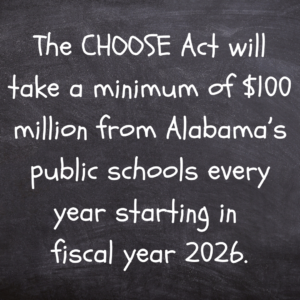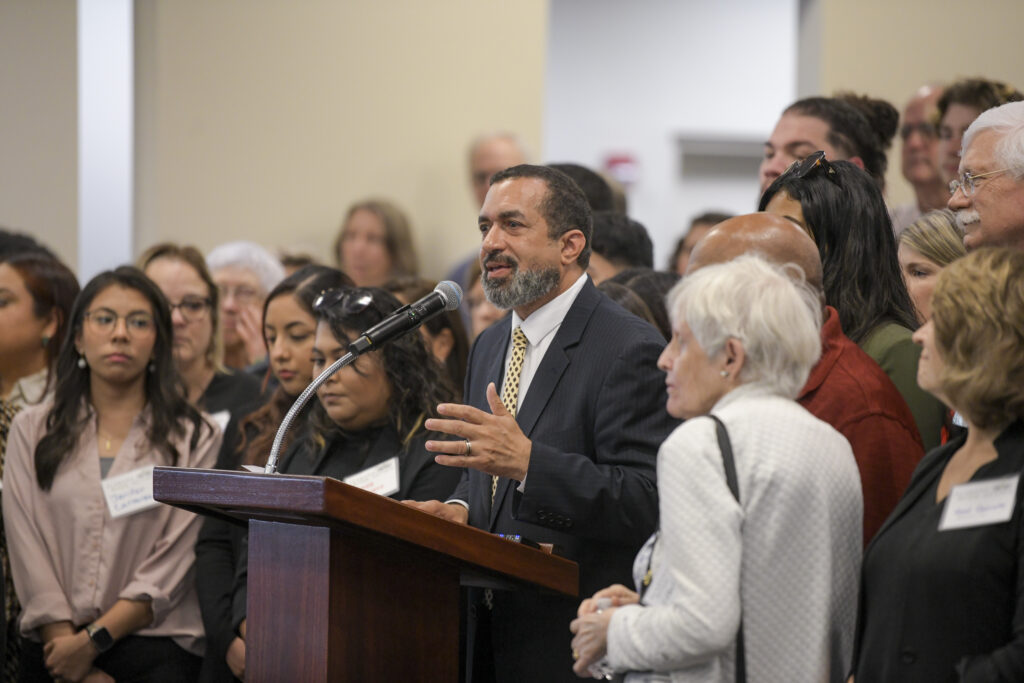Many Alabamians think of public education as a natural part of growing up and of community life. Public schools are at the center of hundreds of communities across our state. And their calendars often set a rhythm for the flow of the year: football games in the fall, band concerts and theater productions in the winter, proms in the spring and graduation ceremonies in May.
So it might surprise most Alabamians to know the Alabama Constitution – our foundational document – does not guarantee our children a right to public education. And despite our pride in our local schools, Alabama historically has failed to fund those schools adequately.
Thirty-nine states and the District of Columbia spend more in state and local funds per student than Alabama. And despite legislative boasts that Alabama education budgets have hit record high, our state funding for K-12 schools since 2009 has failed to keep up with inflation.
Now a new law will make that underinvestment even worse. Alabama’s public schools took a big funding hit in 2024 when the Legislature passed the Creating Hope and Opportunity for our Students’ Education (CHOOSE) Act. The CHOOSE Act will give parents a refundable tax credit of up to $7,000 per child for private school or homeschooling. Parents will be eligible for the credit regardless of whether their child has ever been enrolled in a public school. And in a few years, every parent in Alabama will be eligible, no matter how high their income may be.
Because the tax credit is refundable, parents can receive more money for private school tuition than they actually paid in taxes. The money for these “education savings accounts” – essentially school vouchers by another name – will come from sales and income tax revenues that otherwise would go to Alabama’s public schools under the Education Trust Fund (ETF).
How the CHOOSE Act became law
Lawmakers laid the foundation for the CHOOSE Act in 2013 when they hurriedly passed the Alabama Accountability Act (AAA). That law created a limited number of tax credits to subsidize private school tuition, with priority given to parents of children zoned for so-called “failing schools.” Many of these schools serve disproportionate shares of Black and Hispanic students and are located in communities with high poverty rates and a history of state underinvestment. The AAA also gave tax breaks for donations to some groups that give scholarships to pay for private school tuition. State law caps the total amount of AAA tax credits at $40 million annually, with flexibility for that amount to increase to $60 million eventually.
The CHOOSE Act will cost much more, and it is part of a broader nationwide legislative push by conservative activists. More than a dozen states have passed school voucher bills, spurred by ideology rooted in hostility to public education and a misplaced belief that competition improves education. Vouchers for private education are also a key recommendation in the Heritage Foundation’s Project 2025.
In her 2024 State of the State address, Gov. Kay Ivey said, “Passing an education savings account bill … is my number one priority.” The Legislature responded by passing the CHOOSE Act early in the session. Alabama Arise testified against the legislation in both House and Senate committee hearings, but lawmakers fast-tracked the bill to Ivey. She signed it into law in March 2024.
Tax credits eventually will go to all families, regardless of income
Even the wealthiest Alabamians will qualify for CHOOSE Act tax credits – and even if their children never attended public school. Beginning in the 2025 school year, eligibility for education savings accounts under the act will extend to families with incomes below 300% of the federal poverty level (approximately $77,460 for a family of three in 2024). But beginning in the 2027 school year, there will be no income limits to receive the taxpayer funds for private school.
 Children who have special needs, whose parents are active duty service members, or whose siblings already receive a tax credit will have priority. But the law does not require that participating families ever have sent a child to public school. So parents who are already paying private school tuition will become eligible for taxpayer subsidies for their existing private school enrollment.
Children who have special needs, whose parents are active duty service members, or whose siblings already receive a tax credit will have priority. But the law does not require that participating families ever have sent a child to public school. So parents who are already paying private school tuition will become eligible for taxpayer subsidies for their existing private school enrollment.
And because the act places no limit on how many families can get tax credits, almost every applicant will be eligible – with one exception. Undocumented parents and their children are ineligible for the tax credits. Even if the children are American citizens, and even if the parents are paying state, local and federal taxes.
The only limit on the CHOOSE Act’s cost is how much money the Legislature is willing to spend on it. The law requires lawmakers to allocate at least $100 million a year for tax credits under the plan. But without a cap on the overall amount of CHOOSE Act credits, legislators quickly could face enormous pressure to divert much more ETF money away from public schools.
Concerns about a lack of oversight
Schools that receive taxpayer subsidies under the CHOOSE Act will have relatively little public oversight. The act requires much less accountability from private schools than is required from Alabama’s public schools.
Schools that receive funds from education savings accounts are prohibited from discrimination based on race, color or national origin. But the law is silent on their ability to discriminate on the basis of gender, gender identity, sexual orientation or disability status. And while the act names children with special needs as priorities for education savings accounts, private schools – unlike public schools – have no obligation to admit children with special needs.
Schools that receive CHOOSE Act subsidies must be accredited. But a wide list of potential accreditation agencies exists, and the law provides no guarantee that a child will receive an education equivalent to that provided by public schools. Similarly, a standardized assessment of student progress is required, but the assessment now required for public school students is not required for private school students using education savings accounts.
Schools that receive funds under the CHOOSE Act are specifically allowed complete autonomy in designing their curriculum, including religious instruction. And the act does not explicitly forbid these schools to discriminate based on religion in employment and admission policies.
The CHOOSE Act will take money out of public schools
The CHOOSE Act will take a minimum of $100 million from Alabama’s public schools every year starting in fiscal year 2026. This would be a devastating financial blow for underfunded K-12 schools across our state.
That’s bad enough. But things could get much worse: The law does not cap how much can be spent on education savings accounts. And the CHOOSE Act specifically states legislators’ intent to increase expenditures whenever the demand for tax credits exceeds 90% of the allocated funds in the prior year. As accountants across Alabama begin urging their clients to pursue tax credits to help cover the cost of their children’s private school tuition, lawmakers could face intense pressure to allocate significantly more for education savings accounts.
If the takeup of these accounts is high enough, the CHOOSE Act could drain hundreds of millions of dollars each year from the ETF budget and from our public schools. That could lead to larger class sizes and less money for textbooks, technology, school maintenance and other investments in Alabama children’s educational success.
This gutting of money from public schools has played out in other states that have adopted similar programs. In Arizona, education savings accounts were forecast to cost $33 million in the first year and $65 million in the second. Actual costs were more than 10 times higher: nearly $600 million in the first year and more than $700 million in the second. In New Hampshire, costs exploded from an estimate of $300,000 in the first year to more than $8 million in the first year to $25 million in the third.
School ‘choice’ doesn’t improve student achievement
Studies of school achievement have shown that public support of private education doesn’t necessarily lead to higher student achievement or better test scores. Instead, increases in school funding, especially dollars targeted to children with the greatest needs, do improve test scores, graduation rates and post-graduation wages.
The Alabama Legislature is studying the formula by which our state funds public education, with an eye toward increasing equity and opportunity. Any diversion of money to private schools only hurts our efforts to achieve more equitable funding for public schools.
Bottom line
Alabama needs to invest in high-quality public schools focused on meeting the needs of children who live in poverty or face other educational barriers. And our state needs to reject efforts to divert public education dollars to subsidize wealthy households and benefit unaccountable private schools. The CHOOSE Act was the wrong choice for Alabama families, and lawmakers should either drastically reform it or repeal it.








